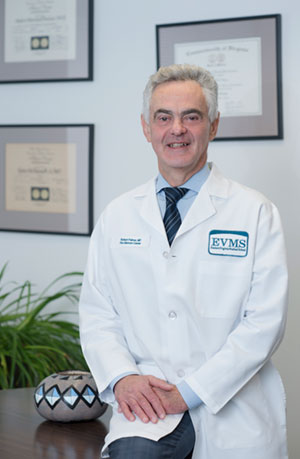John Franklin Chair of Geriatrics, EVMS Director, Glennan Center for Geriatrics and Gerontology
Dr. Robert Palmer took a somewhat circuitous route to the directorship of the Glennan Center for Geriatrics and Gerontology. He says he was born to be a doctor, but didn’t realize until he was in medical school that he was destined to become an internist – and it wasn’t until 10 years after his residency that he went into geriatric medicine. The two compelling passions that have inspired him throughout a nationally distinguished career have been internal medicine – “It offers the combination of taking care of patients and focusing on the mechanisms and treatment of disease,” he says – and working to improve the way healthcare is delivered, on both a small and grand scale.
He received his medical degree from the University of Michigan at Ann Arbor, and as his interest in public health continued to grow, he earned a master of public health at the University of California at Los Angeles. He calls those years transformative. He worked for the LA County Department of Health Services in Pico Rivera, a primarily Mexican-American community, where with funding from the National Heart, Lung and Blood Institute, he was principal investigator and director of a program to create hypertension screening, detection and treatment in the community. That program, he says, has been the template for everything he’s done throughout his career.
From LA, he took a position at Oregon Health Sciences University Medical School in Portland, ultimately being appointed director of the internal medicine residency program.
At that time, geriatrics was a new specialty, not yet a certified fellowship program. “There was such a lack of understanding about how to take care of older people,” he says. “Our knowledge of aging was almost non-existent.” In geriatrics, he saw opportunities both as an educator and a community advocate to enter a field that clearly needed champions.
After pursuing a fellowship in geriatric medicine at UCLA, he moved to Cleveland and joined the faculty at Case Western Reserve University Medical School. With his colleagues at Case, he created a comprehensive geriatrics program focusing on hospital, long-term and outpatient care.
He became research partners with Dr. Seth Landefeld, a general internist and kindred spirit. “We wanted to figure out a cost effective way to take better care of hospitalized patients, in a continuous quality improvement process,” Dr. Palmer says. Their work became known as Acute Care for Elders – or ACE – a nationally recognized model that offers enhanced care for older adults in specially designed hospital units, delivered by an interdisciplinary team of medical professionals, including geriatricians, advanced practice nurses, social workers, pharmacists and physical and occupational therapists. The care in an ACE unit is compassionate and patient-centered, with a demonstrated measurable reduction in the length of hospital stays for these patients. In addition, the costs are less on an ACE unit than on typical care units. Despite this, Dr. Palmer says, “We’re still struggling to get this model of care to become standard practice.” The National Institutes of Health agrees: in a recent abstract, NIH researchers wrote, “Low presence of ACE units warrants further research as to reasons more hospitals have not included them, given the available evidence for clinical, functional, and economic benefits.”
Dr. Palmer assumed the directorship of the Glennan Center for Geriatrics and Gerontology in 2011, and he has attacked that position with the same zeal and innovation that marked his other endeavors. Since his arrival, the Glennan Center has collaborated widely with other departments at EVMS in a variety of research and educational endeavors, and continues to strengthen its ties to organizations within the community.
The faculty of the Glennan Center enjoy clinical practice in outpatient, nursing facility, and palliative care settings. The Memory Consultation Clinic performs detailed evaluation of patients with cognitive decline through a comprehensive team approach to both the medical and psychosocial needs of the patient and caregivers. Dr. Palmer and his colleagues are expanding the practice and the research program, adding a Geriatrics Consult clinic to provide a comprehensive geriatric assessment for frail seniors, with recommendations given to the patient, family and referring physician.
He is working with Dr. Marissa Galicia-Castillo to expand clinical programs in hospital and long-term care-based palliative medicine: “We’re now providing inpatient palliative care consults in two Sentara hospitals and a Sentara skilled nursing facility. We’re also directing a palliative care and hospice program in collaboration with our partners at Beth Sholom Village and Jewish Family Services.” He’s also a consultant at one of the Sentara hospitals that feature an ACE Unit, and direct Geriatric Medical Services at Sentara Norfolk General Hospital.
His commitment to improving the quality of resident education in geriatrics is evident. “We’re heavily engaged in teaching of all learners at EVMS,” he says, “medical and physician assistant students, residents in internal medicine and family medicine, and fellows training in geriatrics. This past year we launched a grant to train Chief Residents of nine different departments in the principles of geriatric practice, patient safety and quality improvement.”
Future plans for the Glennan Center include creating innovative, sustainable clinical programs to benefit the seniors in the community, and to expand research in geriatric safety, palliative care and dementia. With its community-based health care partners, the Glennan Center is ready to implement the “Triple Aim”-to improve the patient experience in all sites of care; to improve the health of the elderly population of Hampton Roads; and to reduce the costs of health care.
“The challenge for us now,” he says, “is to more deeply engage the community in advocating for even better care for our seniors.”


